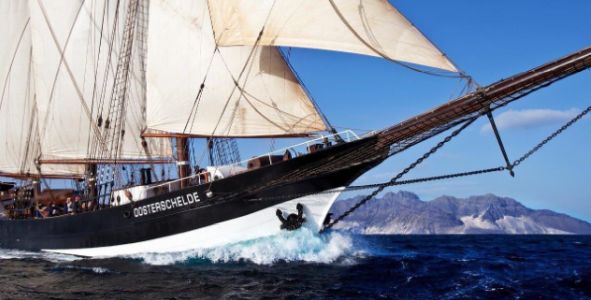 Almost 200 years ago, Charles Darwin set sail from Plymouth, UK, as a naturalist on HMS Beagle on an epic voyage that would prove pivotal in the development of his theories of evolution.
Almost 200 years ago, Charles Darwin set sail from Plymouth, UK, as a naturalist on HMS Beagle on an epic voyage that would prove pivotal in the development of his theories of evolution.
This week, the 105-year-old Dutch schooner Oosterschelde set sail from Plymouth on a two-year voyage to train and inspire a new generation of naturalists by tracing the voyage of HMS Beagle. On the 40,000 nautical mile voyage, the schooner will call at 32 ports around the globe and will serve as a floating laboratory on the sea and in port in the project called Darwin200. The project seeks to harness the legacy of Charles Darwin’s passion for natural history to engage worldwide audiences and advance global conservation.
“Charles Darwin was only 22 when he set sail from Plymouth on his life-changing voyage in 1831 aboard HMS Beagle, famously saying that it was by far the most important event in his life, determining his whole career,” Darwin200 founder and mission director Stewart McPherson said in a statement. “We wanted to create a similarly transformative experience for members of the public and 200 of the world’s brightest young environmentalists, who have the potential to be the STEM and conservation leaders of tomorrow and the catalysts to change the future of planet Earth for the better.”
In addition to helping to train young environmentalists, the project hopes to create the world’s most exciting classroom to reconnect global audiences with nature, science and conservation. They also plan to undertake five research projects tackling many of the world’s most critical environmental problems to engage global audiences in practical solutions.
ABC News reports that the ship will make its first landing in the Canary Islands and then cross the Atlantic to Brazil. It will sail down South America’s east coast and up its west coast and out to the Galapagos Islands where Darwin made some of his most important discoveries.
Sarah Darwin, a botanist, said she supports the mission for using her great-great-grandfather’s voyage to highlight environmental change. She said Charles Darwin’s greatest legacy was recognizing the place of humans in nature.
“I always think it is very much worth reminding ourselves on a daily basis that humans and the rest of the living world share a common origin,” she said. “Darwin was saying that 160 years ago, that we were related with all other nature. We’re not above it, we are part of nature.”
The schooner will go to Australia and New Zealand before returning to South America and then crossing the Atlantic again to South Africa before returning to England.

I have sailed in the Oosterschelde (river) but not in the Oosterschelde (vessel) 🙂